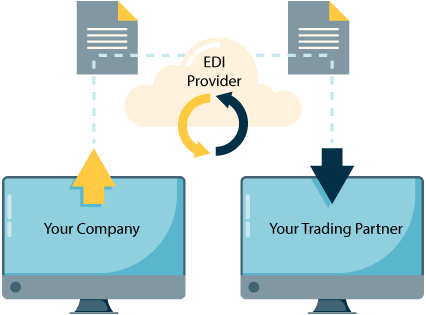Unified Order Management
Built For


Unified Order Management
Managing sales orders from multiple sales channels can be a complex and time-consuming task. Whether selling through eCommerce platforms, online marketplaces, direct sales teams, or utilizing EDI, having a unified approach to order management is crucial.
Imagine having all your orders, regardless of where they originate, seamlessly integrated into one cohesive system. This simplifies your workflow and provides you with a comprehensive view of your sales operations.
Unified order management allows you to streamline processes, improve accuracy, and ultimately enhance customer satisfaction. Adopting a unified order management system ensures that every order is processed efficiently, inventory levels are accurately maintained, and customers receive their products on time.
Integrating Orders from eCommerce Platforms and Online Marketplaces

Integrating orders from eCommerce platforms and online marketplaces is necessary for any business aiming to streamline operations and provide a seamless customer experience.
eCommerce platforms like Shopify, WooCommerce, and Magento are popular choices for online businesses. Additionally, online marketplaces like Amazon, eBay, and Walmart provide businesses access to a vast customer base.
However, when orders start pouring in from multiple platforms, it can quickly become overwhelming without a unified system to manage order consistently. A centralized order management system brings all online orders into the unified environment for processing.
Benefits of Unified Order Management
Integrating orders into a unified system comes with numerous benefits:
- Centralized Order Management: With all your orders in one place, you can easily track, manage, and fulfill them without jumping between different platforms.
- Order Importing: Automation tools import orders from different channels directly into the system, saving time and minimizing manual data entry.
- Improved Accuracy: Integration reduces the risk of errors when manually transferring order information between systems.
- Efficient Inventory Management: A unified system updates inventory levels across all platforms, preventing overselling and stockouts.
- Enhanced Customer Experience: Faster order processing and accurate inventory data mean customers get their orders on time, leading to higher satisfaction and repeat business.
Case Study: Successful eCommerce Integration
Let’s take a look at a real-world example of successful eCommerce integration.

Rotorcorp, founded by brothers Dan and Sean Casey in 2011, has become a leading global supplier of Robinson Helicopter parts. Their vision of providing time-sensitive parts worldwide was realized when they became the first Authorized Robinson Service Center to sell parts online in 2018.
To enhance their customers’ experience, Rotorcorp transitioned from taking orders by email and phone to building a comprehensive eCommerce website. This shift was supported by Acctivate Inventory Management Software, which integrates with their WooCommerce platform, offering real-time inventory visibility and robust operational controls.

While many companies faced labor shortages and logistics delays during 2020 and 2021, Rotorcorp’s solid eCommerce strategy allowed them to maintain operations smoothly. Their customer base increased by 10%, serving critical industries such as agriculture, commercial fishing, law enforcement, and energy.
With Acctivate’s help, Rotorcorp implemented live inventory updates on their website, providing customers real-time stock levels for over 3,200 part numbers. This feature has been crucial for maintaining high customer satisfaction, especially for international clients placing orders outside standard business hours.
Rotorcorp also manages multiple warehouses, including virtual ones for special orders. Acctivate tracks inventory across all locations, helping Rotorcorp efficiently stock high-demand parts and export to over 60 countries. This comprehensive approach has allowed Rotorcorp to serve small organizations and remote areas cost-effectively and promptly.
Streamlining EDI Orders

Electronic Data Interchange (EDI) is a tool for businesses looking to automate and streamline their order processing. EDI allows companies to exchange documents and data electronically with trading partners, eliminating the need for manual data entry and reducing the associated risk of errors.
Introduction to EDI
EDI is a standardized method for transferring documents such as purchase orders, invoices, and shipping notices between companies. By using EDI, businesses can improve efficiency, speed up transactions, and ensure data accuracy.
Benefits of Using EDI for Order Management
Implementing EDI in your order management process offers several significant benefits:
- Automation of Order Processing: EDI automates the exchange of order information, reducing the need for manual intervention and speeding up the order processing cycle.
- Reduction of Errors: EDI significantly reduces the risk of errors caused by human intervention by eliminating manual data entry.
- Cost Savings: Automation through EDI reduces administrative costs associated with order processing, such as labor and paper handling.
- Improved Data Accuracy: EDI ensures that order data is accurate and consistent, leading to fewer discrepancies and improved relationships with trading partners.
- Enhanced Speed and Efficiency: Transactions via EDI are processed much faster than traditional methods, leading to quicker fulfillment and improved customer satisfaction.
Streamlining EDI orders is crucial for businesses looking to improve their order management processes. By automating the exchange of documents and data, companies can save time, reduce costs, and ensure accurate and timely order fulfillment.
Managing Orders from the Direct Sales Team

Direct sales teams are crucial in many businesses, providing personalized customer interactions and tailored solutions. To manage orders from direct sales teams effectively, businesses need a robust order management system that can handle diverse sales channels and complex order requirements, simplifying the direct sales team’s order process from quote to post-sale.
Quoting
Order management software simplifies the quoting process, allowing sales representatives to quickly generate quotes from a single screen. This streamlined approach saves time and ensures that all necessary information is readily available at their fingertips. Once a quote is prepared, it can be converted into a sales order with just one click, providing a seamless transition and significantly reducing the risk of errors during manual entry.
Making the Sale
When making the sale, unified order management software offers a comprehensive solution that covers every detail. Sales representatives can include various chargeable items in the order, such as products, service fees, shipping, and handling charges. This flexibility allows for a more accurate and complete order that reflects all costs associated with the sale.
The system displays the customer’s credit status at the point of order entry, with permission-based override capabilities for authorized users. This feature ensures that sales reps are always aware of the customer’s credit standing, helping to mitigate financial risk while maintaining smooth operations.
Sales reps can set specific requested ship dates, promise dates, and detailed shipping instructions, ensuring that each order meets the customer’s precise needs and expectations. Additionally, mobile sales orders in real time from wireless devices allow sales reps to generate orders on the go, whether at a customer’s location, a tradeshow, or even in the showroom. This real-time functionality ensures that orders are processed quickly and efficiently, no matter where the sales rep is working.
Unified Customer Management
Unified order management software provides unified customer management with tools to track and manage the entire order lifecycle regardless of where the order originated. Every step is meticulously tracked from the initial quote to the sales order, shipping, and any necessary rescheduling or backorders. This end-to-end visibility ensures that orders are processed smoothly and any issues are promptly addressed.
Unified order management software maintains a complete historical record of all customer interactions, including contacts, emails, quotes, orders, invoices, and purchased products. This extensive record-keeping enables businesses to provide personalized service and build stronger customer relationships.
Analyzing sales trends across all channels, gross margins, and other vital metrics becomes effortless. Reporting and analytics tools provide insights that drive informed decision-making and strategic planning.
The Advantages of Unified Order Management

Implementing a unified order management system offers many advantages that can enhance your business operations.
Improved Accuracy and Efficiency in Order Processing
Unified order management systems reduce the risk of errors by automating and standardizing order processing across all sales channels. This ensures that orders are accurately captured, processed, and fulfilled, leading to fewer mistakes and improved operational efficiency. Automation minimizes manual data entry and the potential for human error, allowing your team to focus on more strategic tasks.
Enhanced Customer Satisfaction
When orders are processed accurately and quickly, customers receive their products on time and as expected. A unified system provides real-time updates on order status, inventory levels, and shipping information, enabling you to keep customers up-to-date at every step. Transparency and reliability build trust and loyalty, leading to higher customer satisfaction and repeat business.
Streamlined Workflow and Reduced Operational Costs
By consolidating orders from various sources into a single system, you streamline your workflow and reduce the complexity of managing multiple sales channels. This consolidation eliminates the need for manual reconciliations, reducing operational costs. A unified system also improves coordination between departments, ensuring everyone can access the same accurate information.
Real-Time Inventory Management
A unified order management system provides real-time visibility into inventory levels across all sales channels. This helps prevent stockouts and overselling, ensuring you always have the right products to meet customer demand. Real-time inventory updates enable better inventory planning and management, reducing excess stock and associated carrying costs.
Scalability and Flexibility
As your business grows, a unified order management system can scale with you, accommodating increased order volumes and new sales channels without adding complexity. Whether adding new products, entering new markets, or integrating new sales platforms, a unified system provides the support you need to grow.
Data-Driven Insights and Decision Making
A unified order management system consolidates data from all channels, providing a comprehensive view of your business operations. Information can provide insights into sales trends, customer behavior, and inventory performance. Advanced reporting and analytics tools assist with optimizing your operations and identifying areas for improvement.
Better Management of Multi-Channel Sales
Multiple sales channel order management can be challenging, but a unified order management system makes it easier. You can manage all sales channels by consolidating orders from eCommerce platforms, online marketplaces, direct sales teams, and EDI into a single system. This ensures consistent order processing, inventory management, and customer service across all channels, providing a seamless experience for your customers.
Call us at 817-870-1311





